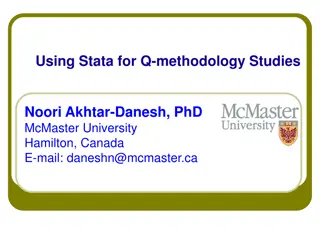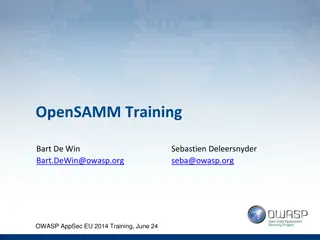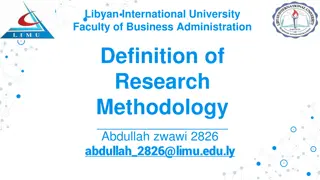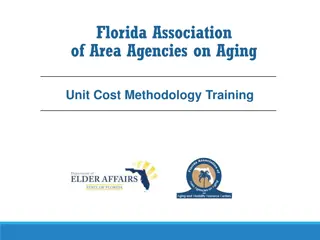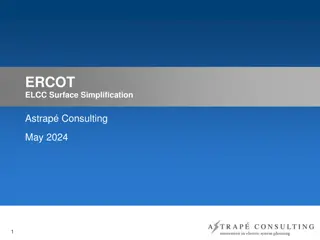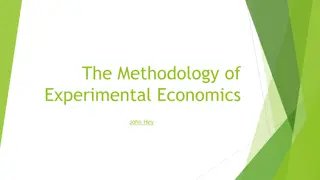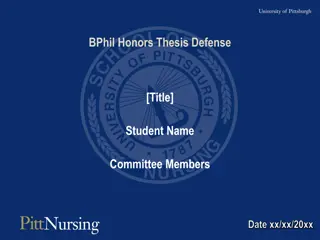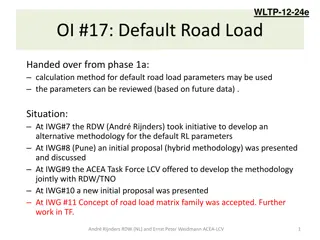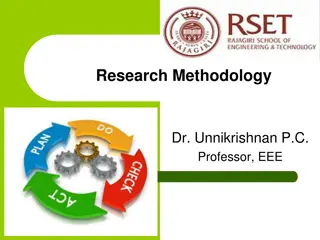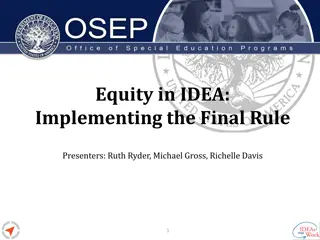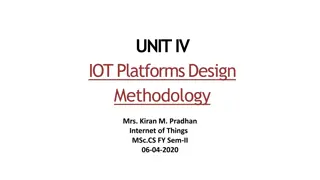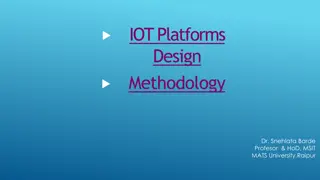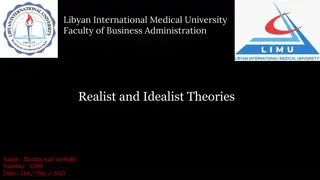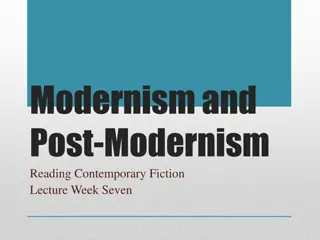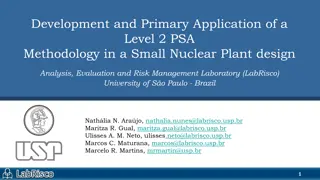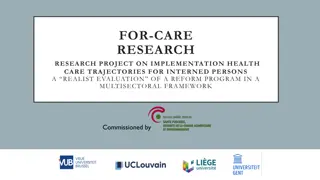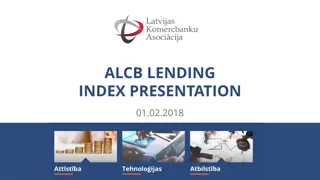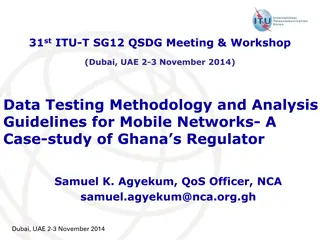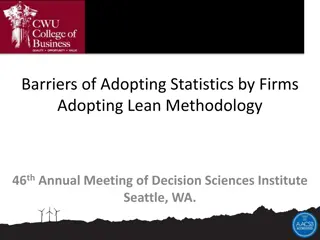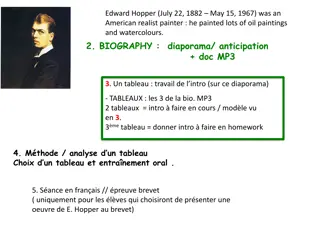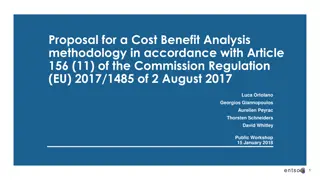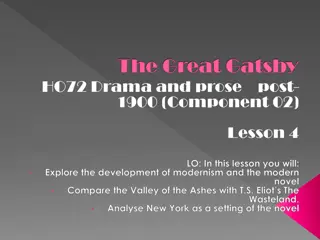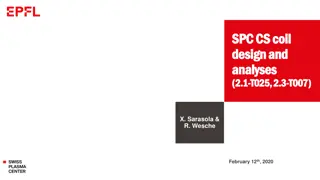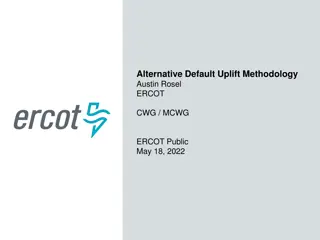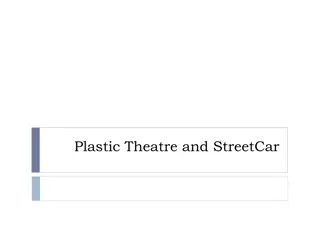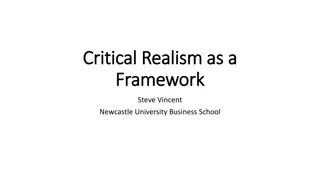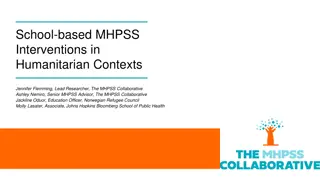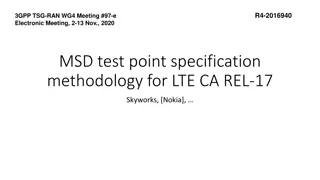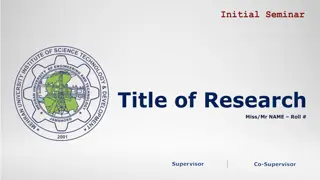Autonomous Conjunction Assessment Methodology Among Satellites
Methodology for Collision Avoidance (CA) among constellations of autonomously-controlled satellites is crucial for protecting assets in space. From straightforward protection against dead satellites to active coordination for maneuverable payloads, the range of primary-secondary CA possibilities is
1 views • 12 slides
Understanding Q-Methodology: A Stata Analysis Overview
Q-Methodology is a research approach focusing on subjective viewpoints. This article discusses the history, goals, and steps involved in a Q-methodology study using Stata programs. It covers the development of a concourse, creation of a Q-sample, Q-sorting activities, and analysis and interpretation
5 views • 46 slides
Practical Application of OpenSAMM Methodology in Software Development
Discussing the practical implementation of OpenSAMM methodology in software development, focusing on its application to different stages of the SDLC. The training session aims to address challenges faced in secure software development, with interactive discussions and best practices shared by indust
7 views • 105 slides
Research Methodology
The Research Methodology course is a mandatory requirement for HST trainees, involving four modules to be completed in ST3 and ST4. Taught by Dr. Rose Galvin via Moodle, the course covers topics such as evidence-based medicine, study design, bias, systematic reviews, biostatistics, and presentation
1 views • 13 slides
Research Findings and Conclusions on Methodology Implementation
This presentation outlines the importance and objectives of the research, detailing the methodology used and presenting the obtained results. Conclusions are drawn, emphasizing key findings and encouraging further exploration of the topic.
0 views • 9 slides
Understanding Research Methodology in Business Administration at Libyan International University
Delve into the world of research methodology at the Faculty of Business Administration, Libyan International University. Learn about the definition of research, types of research, and the distinction between basic and applied research. Discover how qualitative and quantitative research play essentia
0 views • 13 slides
Understanding Unit Cost Methodology Training for Area Agencies on Aging
This training provides an overview of cost allocation principles and the Unit Cost Methodology (UCM) through video sessions and practical applications using UCM spreadsheets. It covers federal regulations, the operation of UCM, and the importance of cost allocation in federally funded programs. The
2 views • 33 slides
Investigation of Marginal ELCC Generation Methodology for Renewable Technologies with Storage Combinations
This project aims to develop a methodology to calculate Marginal ELCCs for non-dispatchable technologies like Solar PV and Wind, along with various storage durations. It proposes leveraging SERVM for LOLE Events, analyzing peak shaving capabilities of storage technologies, and evaluating ELCC via si
0 views • 10 slides
Key Components of Experimental Economics Methodology
Experimental economics methodology emphasizes the importance of clear objectives, controlled environments, honest instructions, and providing subjects with monetary incentives. The experimenter must have a clear objective in mind, ensure tasks are clearly stated for subjects, and analyze data accura
0 views • 12 slides
BPhil Honors Thesis Defense: In-Depth Analysis and Discussion
Delve into the comprehensive presentation of a BPhil Honors thesis defense focusing on the background, purpose, study methodology, results, and discussion. Explore the literature review, gaps in knowledge, problem statement, specific aims, significance, methodology design, statistical analysis, find
1 views • 15 slides
- Development of Alternative Methodology for Default Road Load Parameters in Vehicle Testing
- The initiative to develop an alternative methodology for default road load parameters in vehicle testing was led by RDW and ACEA. The process involved multiple meetings, discussions, and proposals, resulting in the acceptance of the concept of a road load matrix family. Various x-factors were adop
2 views • 22 slides
Comprehensive Guide to Penetration Testing Execution Standard (PTES)
Penetration Testing Execution Standard (PTES) is a crucial methodology to simulate attackers' methods for compromising security controls and gaining access to systems. The PTES process involves phases such as Pre-Engagement, Intelligence Gathering, Threat Modeling, Vulnerability Analysis, Exploitati
3 views • 14 slides
Understanding Research Methodology: Tools, Techniques, and Data Collection
Explore the world of research methodology with Dr. Unnikrishnan P.C., a Professor of Electrical and Electronics Engineering. Learn about the tools and techniques of data collection, different types of data, experiments, surveys, and the differences between survey and experiment data. Discover method
1 views • 34 slides
Understanding Demi-Regularity in Realist Evaluation
Realist Evaluation is a theory-driven approach focusing on understanding the context and mechanisms of action behind policies and interventions. This webinar explores the concept of demi-regularity in realist evaluation, its origins, and its application in analyzing complex evidence. Key aspects cov
1 views • 16 slides
Understanding Balance of Power Theory in Global Politics
Balance of Power Theory in global politics emphasizes the distribution of military capability among states to prevent hegemony and maintain national security. It is a realist theory that highlights the importance of preventing any single state from dominating others. The theory discusses how stronge
1 views • 15 slides
Equity in IDEA: Implementing the Final Rule Presentation
Recap the final rule on equity in IDEA, focusing on standard methodology, remedies, important dates, and addressing questions. Discuss the methodology requirements, including data collection on disproportionality and disciplinary actions. Explore the standard methodology components, like risk ratios
0 views • 49 slides
IoT Platforms Design Methodology for Efficient System Development
Designing IoT systems can be complex due to the interactions between various components like devices, network resources, web services, analytics, applications, and servers. This article presents a generic design methodology for IoT systems that is independent of specific products or services, leadin
2 views • 8 slides
IoT Platforms Design Methodology by Dr. Snehlata Barde - Overview
Designing IoT systems can be complex, but with a generic methodology like the one proposed by Dr. Snehlata Barde, designing, testing, and maintaining IoT systems becomes more efficient. The methodology focuses on purpose, requirements, process specification, domain model specification, information m
0 views • 9 slides
Understanding Realist and Idealist Theories in Business Administration
Realist and Idealist Theories in Business Administration explore contrasting perspectives on reality and idealism. Realism focuses on practicality and facing facts, while idealism emphasizes the ideal world of ideas. Learn about the concepts, examples, and differences between these theories to gain
0 views • 11 slides
Insights into Realism and its Critiques in Literature
Exploring the dominance of realist fiction in European literature, this content delves into the evolution of realism during the Enlightenment period, emphasizing its focus on mimicking social reality. It details the concept of mimesis and verisimilitude in creating a realistic narrative structure th
0 views • 19 slides
Development and Primary Application of Level 2 PSA Methodology in Small Nuclear Plant Design Analysis Lab
The study at the LabRisco in University of São Paulo, Brazil focuses on developing and applying a Level 2 Probabilistic Safety Assessment methodology for a small nuclear plant design evaluation. The work entails identification of severe accident scenarios, analysis of nuclear systems, and construct
0 views • 17 slides
Implementation of Health Care Trajectories for Interned Persons: Realist Evaluation of a Reform Program in a Multisectoral Framework
This research project focuses on evaluating the reform program for the care of Mentally Disordered Offenders (MDOs) within a context of broader mental health care reforms. The study explores governance structures, stakeholder perspectives, collaboration factors, and the experiences of MDOs and their
0 views • 27 slides
ALCB Lending Index Presentation & Methodology Overview
Explore the ALCB Lending Index Presentation held on 01.02.2018, including methodology, results, and discussions on lending for economic growth. Discover the index development process, methodology, and factors impacting banks' ability and desire to lend, as well as borrowers' ability and desire to bo
0 views • 14 slides
Data Testing Methodology and Analysis Guidelines for Mobile Networks - A Case Study
Presentation outlining a data test measurement system for mobile networks, focusing on methodology, hardware components, measurement profiles, configuration, and analysis guidelines. The case study of Ghana's Ashanti Region is discussed, highlighting the test methodology and configuration specificat
0 views • 22 slides
Lean Six Sigma Methodology for Business Excellence
Lean Six Sigma methodology offers a strategic approach to optimize business processes, reduce costs, enhance quality, and improve customer satisfaction. This efficient methodology focuses on eliminating waste and defects to drive revenue growth and profitability for organizations. With a background
0 views • 27 slides
Explore the Life of Edward Hopper: American Realist Painter
Edward Hopper, an American realist painter, was known for his oil paintings and watercolors. This overview delves into his biography, childhood, education, marriages, rise to fame, and legacy. Discover key details about his life, including where he was born, his schooling, significant events, and mo
0 views • 18 slides
Cost-Benefit Analysis Methodology as per EU Regulation 2017/1485
This proposal outlines a comprehensive Cost-Benefit Analysis (CBA) methodology in line with Article 156(11) of the Commission Regulation (EU) 2017/1485. The methodology is designed to address the requirements for Frequency Containment Reserve (FCR) and Limited Energy Reservoirs (LER) within the regu
0 views • 64 slides
Exploring Modernism and the Modern Novel in The Great Gatsby
This lesson delves into the development of modernism and the modern novel through a comparison of The Great Gatsby's Valley of the Ashes with T.S. Eliot's The Wasteland. It discusses the transition from Romanticism to Realism to Modernism in literature, highlighting how Fitzgerald merged poetic Roma
0 views • 7 slides
SPC.CS Coil Design and Analyses: Requirements, Assumptions, and Methodology
This document discusses the design and analysis of SPC.CS coil, focusing on maximizing magnetic flux, survival under fatigue conditions, and materials used for different field layers. It covers requirements, assumptions, and the methodology for uniform current density solenoid design. The study aims
0 views • 15 slides
Understanding Clinical Education Research: Insights and Methodologies
Clinical Education Research delves into various aspects such as teaching, learning strategies, learner wellbeing, professional regulation, and career paths within the clinical education domain. This research explores methods like surveys, interviews, realist reviews, and workplace interventions to e
0 views • 9 slides
Analysis of Default Uplift Methodology Changes in ERCOT
This document delves into the impact of changes to the Default Uplift Methodology in ERCOT, focusing on the removal of CRR Auction activity and the multiplication of CRRs owned. It explores scenarios with varying multipliers at different levels, revealing potential implications for QSEs, CRRAHs, and
0 views • 10 slides
Understanding Plastic Theatre in "A Streetcar Named Desire
Plastic Theatre is a form of non-realist, metaphorical theatre that uses props, sounds, and stage directions to convey characters' states of mind. In "A Streetcar Named Desire," Tennessee Williams incorporates significant elements of Plastic Theatre, such as the Varsouviana Polka, to represent the i
0 views • 14 slides
Unveiling Realist Methodology in Social Research
Uncover the essence of applied realist methodology through features like theory incarnate, context-dependent explanations, and transferable mechanisms. Explore the logic of analysis using the CMO configuration as a heuristic tool for social explanation, emphasizing the importance of context, mechani
0 views • 6 slides
Influential Forces and Outcome of the Paris Peace Conference & Treaty of Versailles
Representatives of major nations convened at the Paris Peace Conference in 1919 to discuss the post-World War I peace process. The Big Four, comprising Great Britain, France, the United States, and Italy, had significant influences in shaping the Treaty of Versailles. The demands of the Big Four var
0 views • 7 slides
Exploring Critical Realism as a Framework
This topic delves into the use of Critical Realism as a framework to develop knowledge about the social world, combining conceptual parts to bridge theoretical gaps and critique existing theories. It discusses ontological commitments, realist ontology, meta-theory, and domain-specific theories, emph
0 views • 22 slides
Exploring Realism: An Artistic Movement in the 19th Century
Realism was an artistic movement that emerged in France in the 1850s, challenging the predominant Romanticism by depicting real and typical contemporary life with truth and accuracy. Led by main realist painters like Gustave Courbet, Realism sought to capture ordinary people and situations, embracin
0 views • 8 slides
School-Based MHPSS Interventions in Humanitarian Contexts Realist Review
Conducted by a team of researchers and advisors, the realist review focuses on understanding the characteristics, mechanisms, and outcomes of school-based Mental Health and Psychosocial Support (MHPSS) interventions in humanitarian settings. The study aims to uncover how these interventions impact t
0 views • 21 slides
Michela Massimi : Four Kinds of Perspectival Truth
Michela Massimi delves into the concept of perspectival truth, discussing how scientific knowledge claims are both situated and perspective-dependent, while states of affairs are perspective-independent. She highlights the central thesis of perspectival realism and the significance of minimal realis
0 views • 14 slides
Evolution of LTE-CA Test Point Specification Methodology for Release-17
The current LTE-CA MSD test point methodology in LTE releases results in specifying redundant test points. Adopting the NR Way of Working for LTE-CA in Release-17 could simplify the MSD tables, reduce complexity, and cut conformance test time/cost. The proposal aims to prevent further expansion of L
0 views • 7 slides
Research Framework and Methodology in Science, Technology, and Humanities
This study delves into developing a robust research framework and methodology in the fields of science, technology, and humanities. It covers literature review, research gap identification, formulation of research questions and objectives, theoretical framework description, and research methodology
2 views • 13 slides

